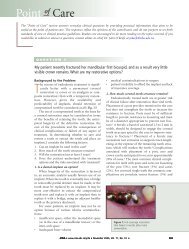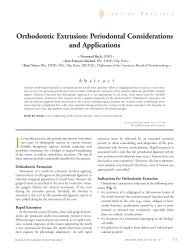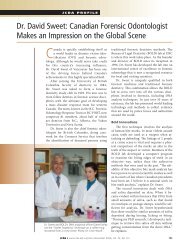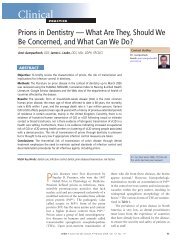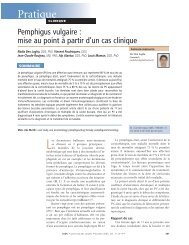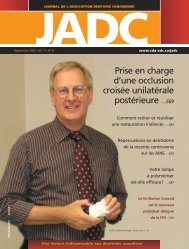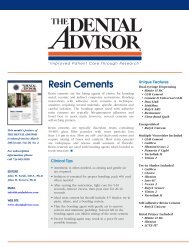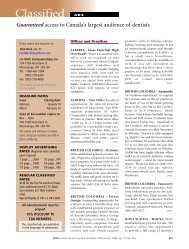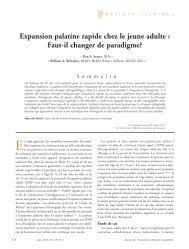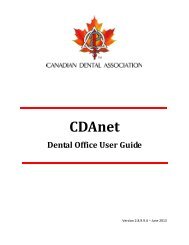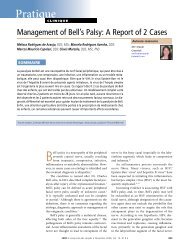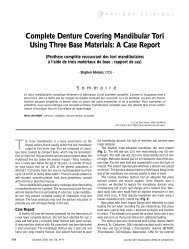JCDA - Canadian Dental Association
JCDA - Canadian Dental Association
JCDA - Canadian Dental Association
You also want an ePaper? Increase the reach of your titles
YUMPU automatically turns print PDFs into web optimized ePapers that Google loves.
p r E s sip dE E cni at ’ l s fcE oa lt u umr nE<br />
Research Revolution at McGill University’s<br />
Faculty of Dentistry<br />
In 1991, McGill University announced that it<br />
would be shutting down its faculty of dentistry.<br />
While no one doubted the quality of<br />
education provided by the faculty, the university<br />
was asserting itself as a research-intensive institution.<br />
Although a small handful of excellent<br />
investigators were still active, the faculty of dentistry<br />
produced relatively little research overall.<br />
But thanks to a concerted and very public effort<br />
by faculty members and supporters, the faculty<br />
of dentistry at McGill University was saved. In<br />
2008, the faculty is still here, but with a major<br />
difference.<br />
“Today, we’re at the point where our research<br />
is among the best for any dental school anywhere,<br />
based on widely accepted research metrics,” says<br />
Dr. Marc McKee, the faculty’s associate dean<br />
of research. “We have a very small faculty, but<br />
if you count on a per capita basis grant dollars,<br />
publications, salary awards, national and<br />
international leadership positions, prizes and<br />
research awards, we most certainly rank among<br />
the top dental schools in the world.”<br />
At the Forefront of Research<br />
The transformation has been stunning. In<br />
2006–07, projects on which McGill faculty of<br />
dentistry researchers were lead or co-investigators<br />
received almost $9 million in funding; when<br />
salaries and student support are included, support<br />
for research surpassed $13 million (compared<br />
to less than $1 million in 1998–99). Since<br />
2005, over 100 publications per year have listed<br />
McGill dentistry in the author affiliations, more<br />
“We’re getting researchers to speak to students<br />
and dentists about the implications and<br />
clinical potential of their Work, and there is<br />
a lot of enthusiasm around these discussions.<br />
the more all these groups talk together,<br />
the better it is for everyone.”<br />
Dr. Marc McKee, associate dean of research<br />
than double the total in 2001. In addition, the<br />
faculty’s operating grants and contracts grew<br />
from 33 to 67 between 2001–02 and 2006–07,<br />
and its graduate student population has also<br />
doubled since 2000. This explosion of activity<br />
has propelled McGill’s faculty of dentistry to<br />
prominence on the <strong>Canadian</strong> and international<br />
research scenes, even without the per capita<br />
proviso. About one-third of all funded oral<br />
health-related research in Canada is carried out<br />
at McGill, despite being home to only 5% of<br />
Canada’s dentistry professors.<br />
Over the past 10 years, because of retirements<br />
and university growth in certain areas<br />
demanding faculty renewal, and with the assistance<br />
of the Canada Research Chairs program,<br />
the faculty has hired 15 new tenure-track professors<br />
with active research programs. Both established<br />
researchers and rising young stars have<br />
been recruited from across Canada, the United<br />
States and Europe.<br />
Establishing Research Priorities and<br />
Partnerships<br />
The research is paying off with some major<br />
breakthroughs. For instance, Dr. Jake Barralet’s<br />
work developing novel bioceramics and processing<br />
methods for bone grafts could change<br />
the way craniofacial and other osseous reconstructive<br />
surgery is carried out. Dr. Marc<br />
McKee’s recent research on molecular determinants<br />
of calcification of bones and teeth, with<br />
applications to limiting debilitating pathologic<br />
calcification of soft tissues such as arteries in<br />
atherosclerosis, has been widely reported.<br />
Dr. Jocelyne Feine’s research<br />
showing the health benefits of overdentures<br />
supported by 2 implants has<br />
also had a significant impact in the<br />
oral health field.<br />
These successes, among others, can<br />
be attributed to a number of factors,<br />
including a set of research priorities<br />
that address some of the most compelling<br />
questions in dentistry today.<br />
Under the guidance of Dr. James<br />
Lund, former dean of dentistry, the<br />
<strong>JCDA</strong> • www.cda-adc.ca/jcda • September 2008, Vol. 74, No. 7 • 599



